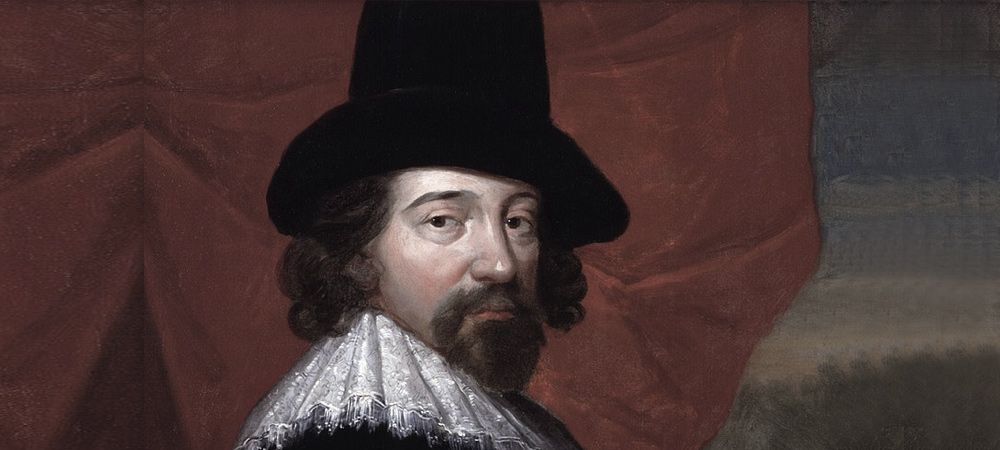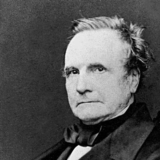フランシス・ベーコン(Francis Bacon、1561~1626年)は、英国の大法官(最高裁判所長官)となった法律家、政治家、哲学者です。
ベーコンは、ケンブリッジ大学トリニティ・カレッジで学び、自然科学に興味を抱くようになります。ベーコンは科学的方法を考案し、確立した人物とされ、実験の重要性とデータから結論を導き出す帰納法を提唱しました。英国初の自然科学の学会である「ロンドン王立協会」が設立されたのは、ベーコンの著作の影響によると言われています。
> 聖書を信じる信仰者聖書を信じる信仰者
フランシス・ベーコンは聖書を熱心に信じるキリスト教徒でした。ベーコンは次のように語っています。
私たちの前には、誤りに陥らないように学ぶべき2つの書物が置かれている。一巻目は、神のみこころを啓示する聖書であり、二巻目は、神の力が啓示されている被造物である。
There are two books laid before us to study, to prevent our falling into error; first, the volume of the Scripture, which reveals the will of God; then the volume of the Creatures, which express His power. 1
> 有名な言葉有名な言葉
フランシス・ベーコンは「知識は力なり」という言葉で有名です。しかし、日本語ではあまり引用されませんが、もう一つ有名な信仰に関する言葉を残しています。ベーコンは、著書で次のように書いています(引用文の全体は付録を参照)。
哲学を少し学ぶと、人の心は無神論に傾くが、哲学を深く学ぶと、人の心は宗教に近づく。
a little Philosophy inclineth Man’s Mind to Atheism; But depth in Philosophy, bringeth Men’s Minds about to Religion. 2
1757年には、スコットランドの哲学者デイビッド・ヒューム(David Hume)が、著書『The Natural History of Religion』で、このベーコンの言葉を引用して次のように語っています。
ベーコン卿は言う。哲学を少し学ぶと人は無神論者になる。哲学を多く学ぶと人は宗教に引き戻される。人は、迷信的な偏見により、誤った場所に(信仰の)重点を置くように教えられる。それがうまくいかなくなり、少し考えてみて自然の営みが規則的で均一であることがわかると、信仰全体がぐらつき、棄教に陥る。しかし、もっと深く考えて、この規則性と均一性こそが、最高の知性を持った方が設計したことの最も強力な証拠であることを教えられると、捨てていた信仰に立ち返るのである。そして、さらに強固で耐久性のある土台の上に信仰を建て上げることができるようになる。
A little philosophy, says my Lord Bacon, makes men atheists: A great deal reconciles them to religion. For men, being taught, by superstitious prejudices, to lay the stress on a wrong place; when that fails them, and they discover, by a little reflection, that the course of nature is regular and uniform, their whole faith totters, and falls to ruin. But being taught, by more reflection, that this very regularity and uniformity is the strongest proof of design and of a supreme intelligence, they return to that belief, which they had deserted; and they are now able to establish it on a firmer and more durable foundation. 3
フランシス・ベーコンは、科学の土台となる科学的方法を確立した人物です。日本では、科学と信仰は対立するものと考えられがちです。しかし、天地を創造した神がおられ、この世界は知性を持って創造されており、一定の法則で動いているという信仰があるために、ベーコンは科学的方法を打ち立てるに至ったのです。
> 付録:引用元付録:引用元
本文で引用した言葉の原文は次のようになっています。
この宇宙という枠組みに知性のある方がいないと信じるぐらいであれば、私はむしろ、伝説やタルムード、コーランにあるすべての寓話を信じる方を選ぶ。神は無神論者に確信を与えるために奇跡を起こすようなことはなさらなかった。神は普段どおりの働きで確信を与えることができるからである。哲学を少し学ぶと人の心が無神論に向かうのは事実であるが、哲学を深く学ぶと人の心は宗教に近づくのである。
I had rather believe all the Fables in the Legend, and the Talmud, and the Alcoran, then that this universal Frame, is without a Mind. And therefore, God never wrought Miracle, to convince Atheism, because his Ordinary Works convince it. It is true, that a little Philosophy inclineth Man’s Mind to Atheism; But depth in Philosophy, bringeth Men’s Minds about to Religion. 4
> 参考資料参考資料
- Henry M. Morris, Men of Science, Men of God (Master Books, 1988)
- “Quote Origin: A Little Philosophy Inclineth Mans Mind to Atheism; But Depth in Philosophy, Bringeth Mens Minds about to Religion,” Quote Investigator, 25 Aug 2018
写真:National Portrait Gallery(パブリックドメイン)
> 脚注脚注
-
Henry M. Morris, Men of Science, Men of God (Master Books, 1988) ↩
-
“Quote Origin: A Little Philosophy Inclineth Mans Mind to Atheism; But Depth in Philosophy, Bringeth Mens Minds about to Religion,” Quote Investigator, 25 Aug 2018 ↩
-
“Quote Origin: A Little Philosophy Inclineth Mans Mind to Atheism; But Depth in Philosophy, Bringeth Mens Minds about to Religion,” Quote Investigator, 25 Aug 2018 ↩
-
Francis Bacon, The Essayes Or Covnsels, Civill and Morall, 1625 ↩



